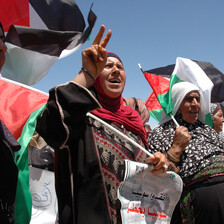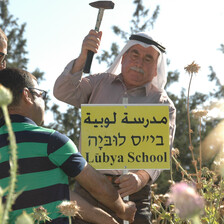The Electronic Intifada 6 November 2014
In a scene from her new film On the Side of the Road, Lia Tarachansky asks Amnon Noimon, a veteran of the Zionist brigades known as Palmach, what role he played in dispossessing Palestinians.
When Noimon indicates that the subject is too painful, Tarachansky replies: “I understand, Amnon. It’s just that because it’s so hard for you to talk about these things, that’s exactly why you must.”
Tarachansky has set out to address the inconvenient truth about the Nakba, the 1948 ethnic cleansing of Palestine. Doing so is vital for justice to be achieved, she believes.
Not only does On the Side of the Road confront the reality of 1948, it examines how Israelis deal with that past today — how it is taught to the young; how the facts about it are available; how those facts are sometimes deliberately ignored.
Tarachansky has broken this taboo as part of what she makes clear is a long and ongoing process of rejecting Zionism. When she was six year old, Tarachansky was brought from Ukraine to the occupied West Bank by her mother. She grew up in the settlement of Ariel on land stolen from the Palestinians, yet inculcated with the idea that the Palestinians were an enemy of Jewish people.
Reporting on Palestine for The Real News Network, Tarachansky now lives in Ottawa, Canada. On the Side of The Road, her first feature film, is currently touring the US.
She spoke to Sarah Levy.
Sarah Levy: What led you to make the film?
Lia Tarachansky: Discovering 1948 for myself, and discovering just how little I knew of my own history. That was really revolutionary for me and I thought that if it was so revolutionary for me maybe it would also be for others.
SL: How did you first hear about the Nakba?
LT: I was working as a journalist in Washington, DC when someone sent me a link to a video of a woman who was a veteran in 1948, who turned out to be Tikva Honig-Parnass.
In that clip, she talks about massive ethnic cleansing campaigns she was involved in, and up to that point I had always thought that if the occupation were to end, then everything would be fine. All the sudden I was hearing about these ethnic cleansing campaigns and that was really shocking.
So I picked up a book by Ilan Pappe called The Ethnic Cleansing of Palestine and that was it for me. It was very clear to me that this [occupation of Palestine] is not just about any one or other fact on the ground; this is about a mentality and an ideology, Zionism. And in a way that makes it a lot harder to tackle because it’s a lot more amorphous, but at the same time it makes it a lot easier to resolve because it’s a conflict of ideas.
SL: You yourself were raised in a settlement, and now you are anti-Zionist. Was there a first instance that nudged you to begin your own process of de-Zionization?
LT: The strongest thing for me was having a conversation with a Palestinian for the first time, when I was at school in Canada.
I was standing somewhere in the university and this guy comes up to me and asks for directions. And we start talking and he says, “You have a strong accent, where are you from?” and I say, “Oh, I’m Israeli,” and he says amiably, “Oh yeah? I’m a Palestinian!”
So he asks for directions and then he goes on his way.
And as he walks away I realize that I’m holding my purse just a little bit tighter, that my whole body is kind of uptight, and it takes me a couple minutes to calm down from being terrified for my life.
But then out of that brief interaction I realized: he knows I’m an Israeli, he told me he’s a Palestinian, and he didn’t try to kill me. That was revolutionary for me because, I’d been told my whole life that Palestinians are just brainless, emotional, primitive murdering anti-Semites who just want to kill Jews all the time.
And here was this totally polite sensible nice guy and yet he was a Palestinian.
I know it sounds horrible but for me, that was something that didn’t fit with anything I had known before. So it actually began a very violent process of tackling a lot of the mythology that I thought was true about the conflict.
SL: What inspired you to look at and understand the issue in terms of what you call “collective amnesia?”
LT: I actually started out making a very different film. It was about historical truth and I had historians and veterans and they would prove that this was collective punishment and ethnic cleansing and that this was terrible …
And what I found was that even though I was shocked by some of the things that I was discovering, when I talked to people in Israel about these things, I wasn’t seeing that “Oh my God!” look on their face. And that’s when I realized, okay, something’s missing here.
Of course that something is that for me I was actually discovering these things for the first time in my life because obviously we don’t learn about it in school and I didn’t hear about it from my grandparents because in 1948 they were still in Soviet Russia.
I ended up basing a lot of my film on the work of Stanley Cohen and his monumental book, States of Denial: Knowing about Atrocities and Suffering. He talks about how societies look at their own collective historical taboos and the experience of their own collective amnesia.
What I found is that it wasn’t that people didn’t know [about the Nakba]. It was that they didn’t assign a moral value to what they knew.
And I wanted to understand why. Because I believed then and I believe now that Israelis by and large are an ethical people. But they are involved in a brutal conflict and many of us participate in that conflict. But that’s not because we are a genocidal people.
And so I wanted to understand what was blocking people from seeing the truth, from understanding what they knew. This is exactly what Stanley Cohen calls “denial”: this process of knowing and now knowing at the same time.
SL: In the film you show a lot of footage of what you could call Jewish extremists, rallying and saying things like, “Yes, I’m a racist. I don’t want Arabs here and I don’t want you here, either.” Has Israeli society always been like this or do you think this level of open racism has intensified?
LT: Yeah, I think that it’s gotten way worse. This [latest attack on Gaza] really brought a lot of the fascists out of the closet.
But to be honest with you I think that a lot of the street enforcers — by street enforces I mean the ordinary people who are, for example, chanting these racist slogans — I think that they’re just the ugly in-your-face version of the whole ideology.
I mean, if you look at Zionism honestly — and I’m not talking about spiritual Zionism where you believe that Jews have a right to Zion and all that; I’m talking about nationalist Zionism, Zionism as practiced not even by [Theodor] Herzl but by people like [David] Ben Gurion — it argues that Israel is a state for the Jews, only for the Jews, and therefore necessarily excludes anyone who’s not a Jew.
I think that the street enforcers are just a natural product of that idea this reaching its logical peak.
SL: How do you see the process of dehumanization of the Palestinians as a part of the Zionist project? For instance, how is the dehumanization of Palestinians learned or passed on growing up in Israel?
LT: I think the brainwashing about Palestinians for Israelis is more about what is not said than what is said.
Growing up in a settlement I never thought about the Palestinians. They never played any major role in my life. I never interacted with them. I never spoke to them. There was no place where our paths crossed.
Yet by the time I finished [high] school I was convinced that it would be so much better if the Palestinians just were not here. It was just a natural thing that they are the cause of death to Israelis, they are violent, they throw stones at our soldiers, they started the intifadas, and they want to kill all the Jews. These are a people that we’ve been fighting forever and ever, and it’s never going to end until either they’re all dead or they’re somewhere else. And that’s it.
SL: What do you hope to come out of the film?
LT: I hope that the discussion in the activist community shifts from focusing exclusively on how many checkpoints and settlements there are and this whole discourse about the facts on the ground. These are important, but really not as important as people think.
I really think that there’s nothing that exists right now on the ground that cannot be dismantled. By changing the ideology of the regime, everything is easily changeable. I think this is what we need to talk about and this is what we need to tackle and this is what I tried to do in my film.
SL: What do you think it will take to reach a solution in the region?
LT: The very first step is to stop funding the Israeli arms industry. This means boycott, divestment and sanctions to pressure the US and Israel and to delegitimize the idea of an ethnocracy. I’m not saying delegitimize the right of the Jewish people to live in Palestine or Israel — I’m talking about delegitimizing Zionism.
Sarah Levy is an independent journalist living in the West Bank. Follow her on Twitter: @levysarahm




